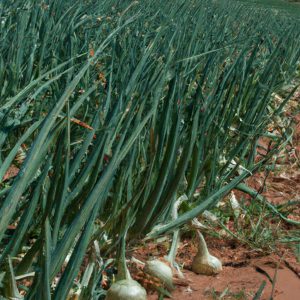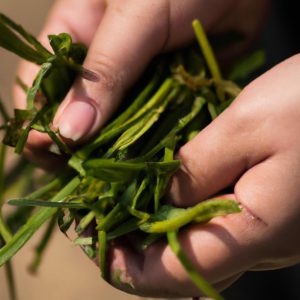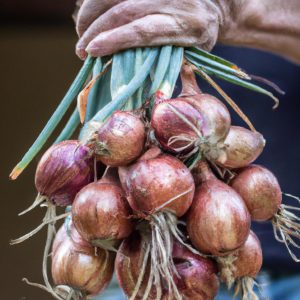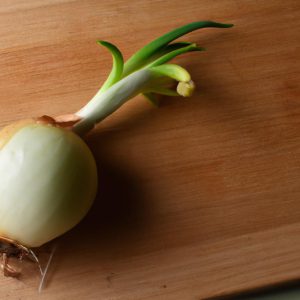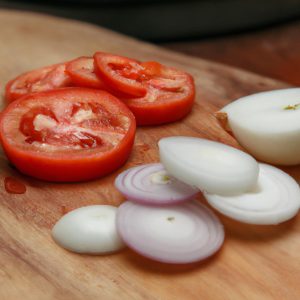Have you heard of the carnivore diet? It’s a diet that’s been gaining popularity in recent years, especially among the fitness and health communities. The carnivore diet is a way of eating that involves consuming only animal products, such as meat, fish, eggs, and dairy. The idea behind the diet is to eliminate all plant-based foods, which are believed to cause inflammation and other health problems.
One of the most hotly debated topics in the carnivore diet community is whether or not onions are allowed on the diet. Some people believe that onions are a vegetable and therefore not allowed on the carnivore diet. Others argue that onions are technically a bulb and should be allowed. So, what’s the truth? In this article, we’ll explore the controversy surrounding onions on the carnivore diet and provide you with all the information you need to make an informed decision.
Nutritional Value of Onions

Onions are a staple ingredient in many cuisines around the world. They’re known for their pungent flavor and ability to add depth to a dish. But did you know that onions are also packed with nutrients? Here’s a breakdown of the nutritional value of onions:
Nutrients Found in Onions
- Vitamin C: Onions are a great source of vitamin C, which is essential for the growth, development, and repair of body tissues. One medium onion contains about 12% of the daily recommended intake of vitamin C.
- Fiber: Onions are high in fiber, which is important for maintaining digestive health and preventing constipation. One medium onion contains about 1.9 grams of fiber.
- Folate: Onions are a good source of folate, which is important for red blood cell formation and fetal development during pregnancy. One medium onion contains about 10% of the daily recommended intake of folate.
- Potassium: Onions are also a good source of potassium, which is important for regulating blood pressure and maintaining heart health. One medium onion contains about 8% of the daily recommended intake of potassium.
Health Benefits of Consuming Onions
In addition to being nutrient-dense, onions also offer a variety of health benefits. Here are a few:
- Anti-inflammatory: Onions contain compounds that have anti-inflammatory properties, which can help reduce inflammation in the body and potentially lower the risk of chronic diseases like heart disease and cancer.
- Antioxidants: Onions are rich in antioxidants, which help protect the body against damage from harmful molecules called free radicals. This can potentially reduce the risk of chronic diseases and slow the aging process.
- Immune System Boost: Onions are high in vitamin C, which can help boost the immune system and potentially reduce the risk of infections like the common cold.
In conclusion, onions are a nutrient-dense food that offers a variety of health benefits. However, the question remains: can you eat onions on the carnivore diet? Let’s explore that in the next section.
The Carnivore Diet

If you’re not familiar with the carnivore diet, it’s a diet that’s based on the idea of eating only animal products. The diet is a subset of the low-carb, high-fat (LCHF) and ketogenic diet, and it’s believed to offer several health benefits.
Definition and Principles of the Carnivore Diet
The carnivore diet is a diet that involves eating only animal products. This includes meat, fish, eggs, and dairy products. The diet is based on the idea that humans evolved to eat meat and that plant-based foods are not essential for our health.
The diet is typically high in fat and low in carbohydrates, with most of the calories coming from fat. This helps to put the body into a state of ketosis, which is believed to offer several health benefits.
Explanation of the Strict Rules of the Diet
The carnivore diet is a very strict diet, and there are several rules that you need to follow if you want to be successful. Here are some of the key principles of the carnivore diet:
- Eat only animal products: This means that you should avoid all plant-based foods, including fruits, vegetables, and grains.
- Don’t count calories: Instead of counting calories, you should focus on eating until you’re full. This typically means that you’ll be consuming a lot of calories, but it’s believed to be necessary for the diet to work.
- Eat when you’re hungry: You should eat when you’re hungry and stop when you’re full. This helps to regulate your appetite and prevent overeating.
- Drink water: Water is the only beverage that’s allowed on the diet. You should aim to drink at least eight glasses of water per day.
By following these strict rules, you can expect to see some significant changes in your body composition and overall health. However, it’s important to note that the carnivore diet is not suitable for everyone, and it’s always best to consult with a medical professional before starting any new diet.
Onions and the Carnivore Diet

Onions have become a hot topic of debate in the carnivore diet community. Some argue that onions are a vegetable and should, therefore, be avoided on the diet. Others argue that onions are technically a bulb and should be allowed. Let’s explore both sides of the argument.
Debate surrounding the consumption of onions on the carnivore diet
The debate surrounding onions on the carnivore diet centers around whether or not onions are considered a vegetable. Supporters of the diet argue that onions are a vegetable and should be avoided as they contain fructose, which can cause inflammation in the body. On the other hand, opponents of this argument state that onions are technically a bulb, and therefore, should be allowed on the carnivore diet.
Arguments for and against eating onions on the diet
Those who argue against eating onions on the carnivore diet believe that onions are a high-carbohydrate vegetable that can cause inflammation in the body. They also believe that onions contain anti-nutrients that can interfere with the absorption of nutrients from other foods.
On the other hand, those who argue in favor of eating onions on the carnivore diet believe that onions are a low-carbohydrate vegetable that can provide essential nutrients. They also argue that onions contain prebiotic fibers that can improve gut health.
In conclusion, the debate surrounding onions on the carnivore diet is ongoing. While some argue that onions should be avoided due to their high-carbohydrate content, others believe that they are a low-carbohydrate vegetable that can provide essential nutrients. It’s up to each individual to decide whether or not to include onions in their carnivore diet.
Alternative Options for Onion Flavor
Spices and Seasonings for Onion Flavor
If you’re following the carnivore diet and missing the flavor of onions, don’t worry, there are plenty of alternatives that can provide a similar taste. One of the most popular options is garlic, which is also a bulb but is allowed on the carnivore diet. Garlic has a strong flavor that can be used in place of onions in many dishes.
Other spices and seasonings that can be used to replace onions include:
- Shallots: Shallots are a type of onion but are smaller and have a milder flavor. They can be used in moderation on the carnivore diet.
- Chives: Chives are a herb that have a mild onion flavor. They can be used to add flavor to eggs, meat, and salads.
- Celery: Celery has a similar texture and flavor to onions. It can be used in soups, stews, and salads to add crunch and flavor.
- Salt and Pepper: Sometimes all you need is a little bit of salt and pepper to enhance the flavor of your meat.
Incorporating Alternatives into the Carnivore Diet
When incorporating these alternative options into your carnivore diet, it’s important to remember to use them in moderation. While they may be allowed on the diet, they should not become a significant part of your daily intake.
One way to use these alternatives is to add them to your meat dishes. For example, you could sauté garlic in butter and use it as a topping for your steak. Or you could mix chives into your scrambled eggs for breakfast.
Another way to incorporate these alternatives is to use them as a seasoning for your meat. You could mix salt, pepper, and celery salt together and use it to season your chicken or fish.
By using these alternative options for onion flavor, you can still enjoy the taste of your favorite dishes while following the carnivore diet.
Conclusion
So, can you eat onions on the carnivore diet? It’s a personal decision that depends on your interpretation of the carnivore diet rules and your personal goals. While some people believe that onions are a vegetable and should be avoided on the carnivore diet, others argue that onions are technically a bulb and should be allowed.
Regardless of your stance on onions, it’s important to remember that the carnivore diet is a highly restrictive way of eating that eliminates entire food groups. While some people may experience weight loss and other health benefits on the diet, it may not be sustainable or suitable for everyone.
If you’re looking to incorporate more flavor into your carnivore diet, there are plenty of alternative options for onion flavor. Spices like garlic, cumin, and paprika can add depth and complexity to your meals without breaking the rules of the diet.
In conclusion, the carnivore diet is a highly controversial way of eating that requires strict adherence to a set of rules. While the debate surrounding onions on the diet continues, it’s important to listen to your body and make choices that work for you. Whether you decide to include onions in your carnivore diet or not, always prioritize your health and well-being first and foremost.
Thank you for reading this article on onionfacts.com. We hope you found it informative and helpful in your journey towards optimal health.

